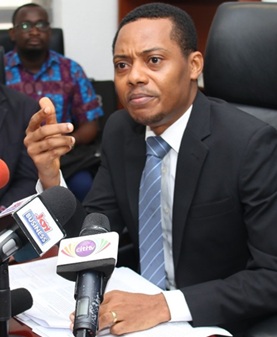IFS Questions Credibility of Gov’t’s 2025 Revenue Targets

The Institute for Fiscal Studies (IFS) has raised serious concerns over the credibility of government’s revised 2025 revenue projections, warning that persistent shortfalls could deepen budget financing pressures and stall critical investments.
According to Mr. Leslie Dwight Mensah, Senior Research Fellow at the IFS, the government’s mid-year budget review increased projected revenue and grants by GH₵2.87 billion, raising the full-year target to GH₵229.95 billion, or 16.4% of GDP. The revision is anchored largely on proceeds from a new GH₵1 petroleum levy under ESLA.
Yet, Mr. Mensah argued, the revised estimates fail to account for the GH₵3.24 billion revenue shortfall recorded in the first half of the year. “All major revenue lines — oil, import duty, and non-oil non-tax revenues — fell below target, but government has kept their annual projections unchanged,” he said.
Missed Targets, Familiar Patterns
Oil receipts alone fell short by 42.9% (GH₵2.66 billion) between January and June, while import duties underperformed by 12.7% (GH₵1.59 billion) and non-oil non-tax revenues by 15.6% (GH₵1.48 billion). Despite these setbacks, government maintained the same full-year targets.
The IFS review stressed that Ghana’s revenue mobilization has consistently struggled to cross the 16% of GDP threshold. The best outcome in nearly a decade was 15.9% in 2024, despite multiple tax measures. “It is difficult to see how the same strategies will suddenly deliver 16.4% in 2025,” Mr. Mensah noted.
Implications for Business and the Economy
The Institute warned that if revenues again fall short, government will have limited room to finance capital projects, arrears payments, and other development priorities, prolonging infrastructure bottlenecks and liquidity challenges in the private sector.
However, weak spending may offer the government one unintended benefit: it could project fiscal prudence to credit rating agencies. “Improved ratings might tempt the government to return to the international bond market,” Mr. Mensah added, cautioning that this must be approached carefully to avoid piling on unsustainable debt.
A Structural Problem
For businesses, the recurring mismatch between projected and actual revenues signals continued uncertainty in fiscal policy, with possible knock-on effects on tax administration, procurement contracts, and public investment. Analysts say until government tackles structural revenue weaknesses — such as over-reliance on volatile oil income and import duties — budget credibility will remain in doubt.
The IFS concluded that the mid-year review missed an opportunity to address these bottlenecks with concrete reforms, leaving Ghana’s fiscal framework vulnerable for the rest of 2025.




